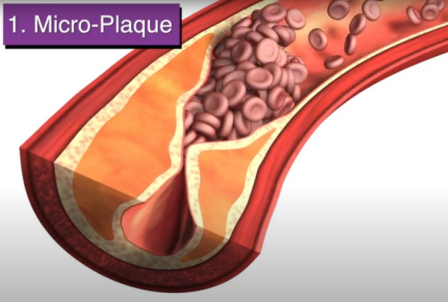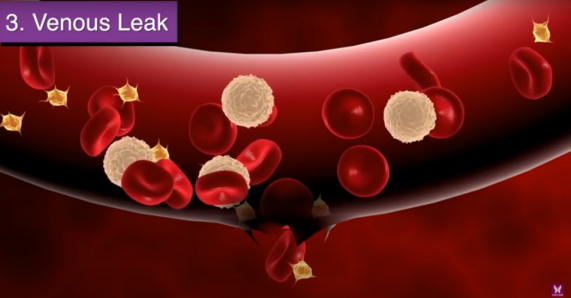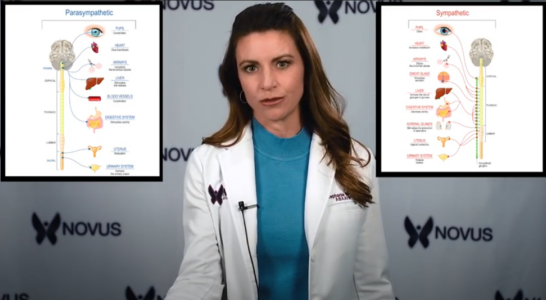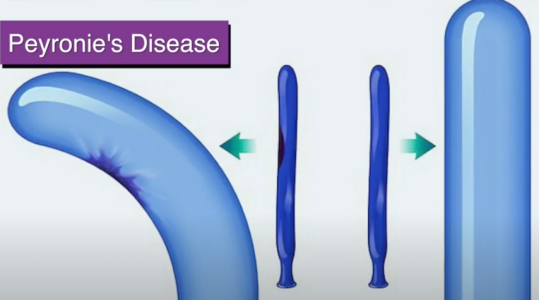In this video, Stephanie Wolff, P.A.-C, board-certified PA-C and CEO of Novus Anti-Aging Center, describes the top 10 causes of erectile dysfunction. Erectile dysfunction, or ED, is a common issue for men. The better an ED sufferer understands the cause of their issue, the easier it is to address it.
Top 10 Causes of Erectile Dysfunction
1. Micro-Plaque
 Plaque is a substance that slowly builds up in the blood vessels over time. It is composed of materials carried in the bloodstream like fat, calcium, fibrin, and cholesterol. Small deposits of plaque buildup are called micro-plaque.
Plaque is a substance that slowly builds up in the blood vessels over time. It is composed of materials carried in the bloodstream like fat, calcium, fibrin, and cholesterol. Small deposits of plaque buildup are called micro-plaque.
Everyone develops these deposits of micro-plaque. They start to build up in early childhood, and as time goes on, more and more micro-plaque deposits develop and increase in size. Though various medications, lifestyle choices, diet changes, and even certain disease processes can inhibit the development of plaque to some degree, it will always occur.
Micro-plaque often acts as a plug, slowing or blocking bloodflow through the blood vessels. The tissues of the penis need blood to create erections. When micro-plaque inhibits bloodflow, this can result in erectile dysfunction.
2. Diabetes
Insulin is a hormone that regulates glucose levels in the bloodstream. When a person has diabetes, their body may not use insulin well or make enough insulin. This leads to more glucose in the bloodstream than is healthy or safe.
High levels of glucose destroy the blood vessels, making it very difficult for them to send blood to the penis for erections. Uncontrolled diabetes is particularly dangerous when it comes to erectile dysfunction, and getting one’s diabetes under control is a major step in addressing ED.
3. Venous Leak
 Venous leaks occur when the valves of the veins don’t work as well as they used to. These valves are like tiny doors, and they need to be able to close properly in order to send blood to the penis and to keep the blood there to maintain an erection.
Venous leaks occur when the valves of the veins don’t work as well as they used to. These valves are like tiny doors, and they need to be able to close properly in order to send blood to the penis and to keep the blood there to maintain an erection.
Venous leak is a common issue that can occur at all ages and is experienced most often by the elderly. It can result from lifestyle factors like being overweight, smoking, or sitting for extended periods of time.
4. High Blood Pressure
High blood pressure causes vasoconstriction, the narrowing of the blood vessels. This makes it difficult for them to carry blood to the tissues of the penis, resulting in erectile dysfunction. Patients with high blood pressure are prescribed vasodilators, medications that open up the blood vessels to restore proper bloodflow.
5. Unhealthy Lifestyle
An unhealthy lifestyle can lead to a number of issues, including ED. People who smoke, are overweight, have uncontrolled diabetes, have uncontrolled high blood pressure, or never exercise tend to have trouble when it comes to proper bloodflow. Making changes to one’s lifestyle can make a major difference in their ability to achieve and maintain erections.
6. Depression
Depression affects the ability to get erections in two ways:
- Feel-good hormones like oxytocin and dopamine are required for achieving erections. When a person is suffering from depression, these neurotransmitters are not being created and thus cannot signal the body to make an erection occur.
- Antidepressant medications can lower a person’s testosterone levels. Testosterone is vital for the libido and for erections.
7. Low Testosterone
Testosterone is a hormone required for a healthy sex drive, and when the body’s testosterone level is too low, it can impair a person’s ability to want or have sex.
Testosterone also signals the blood vessels to widen, or dilate, improving bloodflow to the penis for firmer erections.
8. Hormone Imbalance

It’s a common misconception that hormone balancing automatically means raising one’s testosterone levels. In actuality, there are a wide variety of hormones that need to be in proper balance. These hormones can affect energy levels, sleep, mood, and one’s ability to achieve and maintain erections.
While testosterone is required for firm erections, so are estrogen and dihydrotestosterone (DHT). The right amount of each is required. This means that if you have too much or too little of any of these hormones, it can lead to ED.
9. Performance Anxiety
 Performance anxiety is related to the autonomic nerve system. This controls your sympathetic and parasympathetic nerves, which both aid in carrying blood to the tissues of the penis.
Performance anxiety is related to the autonomic nerve system. This controls your sympathetic and parasympathetic nerves, which both aid in carrying blood to the tissues of the penis.
Your sympathetic system is your fight-or-flight instinct. This is required for ejaculation.
Your parasympathetic system, sometimes called your “rest and digest” system, has more to do with calmness and relaxation. This allows blood vessels to be in a vasodilated state, which is required for proper bloodflow and erections.
With performance anxiety, the body is experiencing constant fight-or-flight, making it impossible to be calm enough to achieve an erection.
10. Nerve Damage
Nerve damage can result from injuries or as an undesirable side effect of surgery. Surgical nerve damage that can affect erections typically comes about as a result of prostectomy surgery (removal of the prostate), which is often performed to address prostate cancer.
80 percent of men who have undergone prostate removal suffer from ED. The main nerve responsible for sensation in the penis travels through the prostate gland. This nerve is also necessary for building the smooth muscle cells that help in getting erections.
When the main nerve is damaged, smooth muscle cells atrophy (die) and sensation is eliminated, both issues that make it more difficult to achieve erections.
If I Have Peyronie’s Disease, Does That Mean I’ll Have Erectile Dysfunction?

Peyronie’s disease does not always result in ED. Many men with Peyronie’s disease can still achieve and maintain erections.
There are two factors that play a role in determining whether or not Peyronie’s disease sufferers have erectile dysfunction:
- Degree of penile curvature
- Amount of scar tissue present
Men with severe penile curvature will avoid getting erections, since erections can cause physical pain for them.
Men with an extensive amount of dense penile scar tissue are not able to receive symmetrical bloodflow to the area. Without this symmetrical bloodflow, erections cannot be firm enough for intercourse.
Clinical Studies
The following clinical studies relate to this topic:
- Erectile Dysfunction Treatment Using Focused Linear Low-Intensity Extracorporeal Shockwaves: Single-Blind, Sham-Controlled, Randomized Clinical Trial
- Shockwave therapy as first-line treatment for Peyronie’s disease: a prospective study
- Recent advances in the understanding and management of erectile dysfunction
- Safety and feasibility of platelet rich fibrin matrix injections for treatment of common urologic conditions
- Testosterone Therapy Improves Erectile Function and Libido in Hypogonadal Men
- Stem Cell Therapy for Erectile Dysfunction
- MSC-derived exosomes ameliorate erectile dysfunction by alleviation of corpus cavernosum smooth muscle apoptosis in a rat model of cavernous nerve injury
Get Started Today
If you’re unsure about which of these 10 causes of erectile dysfunction is the root cause of your issue, a quiz is available at GetMyProtocol.com. After taking the quiz, you will receive a treatment plan. You can also contact Novus Anti-Aging Center in Los Angeles to set up a personalized consultation with a skilled sexual health specialist.

